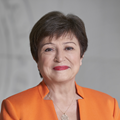IMF Seminar: A Critical Year for Climate Action: A Conversation between Kristalina Georgieva and John Kerry
Overview
As the world emerges from COVID-19, there is renewed impetus to tackle climate change. Ahead of COP26, this session will discuss how to turn climate ambitions into action while creating vibrant and inclusive opportunities as part of the transition to the new climate economy.
IMF Seminar: A Critical Year for Climate Action: A Conversation between Kristalina Georgieva and John Kerry
As the world emerges from COVID-19, there is renewed impetus to tackle climate change. Ahead of the COP26, Kristalina Georgieva and John Kerry discussed how to turn climate ambitions into action while creating vibrant and inclusive opportunities as part of the transition to the new green economy.
Key Points:
- Risks and opportunities: Georgieva noted that climate change poses growing macroeconomic and financial risks. She and Kerry agreed that climate action (e.g., investment in clean technologies and climate resilience) presents an opportunity to generate “green” growth and millions of new jobs (e.g., wind turbine technicians and solar panel installers).
- Transition: Kerry stressed that to successfully contain temperature rise, all countries must act collectively, at the same time, in the next 10 years. Emission reduction should focus on those areas where emissions are concentrated (transportation (27%), power production (27%), industry (20%), agriculture, and buildings). The market is already moving away from coal toward renewables and alternative, sustainable energy (e.g., green and blue hydrogen, battery storage). By 2035, the United States will produce all of its power carbon-free. Concessional and private finance will be instrumental. Georgieva underscored the importance of explicitly measuring risks (e.g., banks’ investments in high-carbon sectors) to help move capital in the right direction.
- Fund’s role: Georgieva explained that the Fund is looking at how its members can be more successful in mitigation and adaptation strategies, including having sufficient financial buffers to react to shocks and invest in resilience and adaptation (e.g., reforestation, mangrove restoration, dealing with land degradation). The Fund is also helping countries measure financial stability risks stemming from climate and enhancing climate data.
- Challenges ahead: To accelerate the transition to a low-carbon economy, Georgieva stressed three pillars: (i) substantially raising carbon prices (from $2 per ton today to $75 by 2030) and pricing more emissions (only 23% of carbon emissions are priced today), (ii) providing sufficient funding for public green investments, and (iii) buffering the impact on and re-skilling those currently working in high-carbon sectors.
Quotes:
“Climate change is a growing risk to macroeconomic stability and to financial stability” Kristalina Georgieva
“Climate is now in the DNA of our institution; at the heart of our work.” Kristalina Georgieva
“By 2035, the United States will produce all of its power carbon-free.” John Kerry
“This is gonna [sic] be the biggest economic transformation since the industrial revolution” John Kerry
Panelists


On January 20th 2021, John F. Kerry was sworn in as our nation’s first Special Presidential Envoy for Climate and the first-ever Principal to sit on the National Security Council entirely dedicated to climate change. President Biden announced Kerry would have a seat at every table around the world as he combats the climate crisis to meet the existential threat that we face. In recent years, Kerry was the Carnegie Endowment for International Peace’s first ever Visiting Distinguished Statesman, following his four years as the 68th United States Secretary of State. As America’s top diplomat, he guided the Department’s strategy on nuclear nonproliferation, combating radical extremism, and the threat of climate change. His tenure was marked by the successful negotiation of the Iran nuclear deal and the Paris Climate Agreement.
From 1985 to 2013, he served as a U.S. Senator representing Massachusetts, and was Chairman of the Senate Foreign Relations Committee from 2009 to 2013. Secretary Kerry served in the U.S. Navy, completing two combat tours of duty in Vietnam for which he received a Silver Star, a Bronze Star with Combat V, and three Purple Hearts. He received his undergraduate degree from Yale University and his law degree from Boston College Law School. Secretary Kerry is the best-selling author of A Call to Service, This Moment on Earth with his wife Teresa Heinz Kerry, andhis 2018 memoir, Every Day Is Extra, which The New York Times described as “a bittersweet reminder of what the country once demanded of its leaders.” Secretary Kerry was the Democratic Party’s nominee for President of the United States in 2004.



